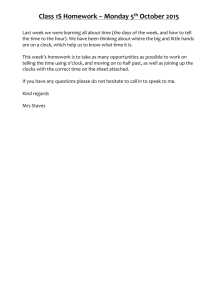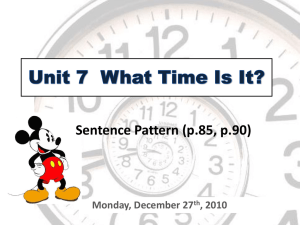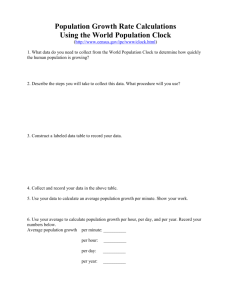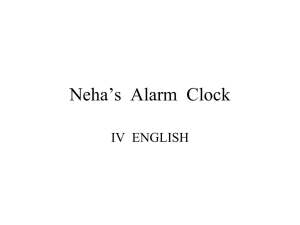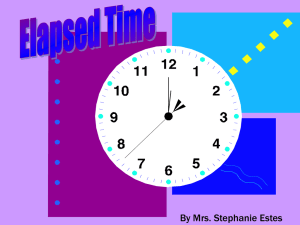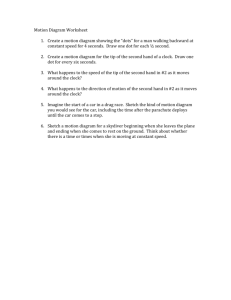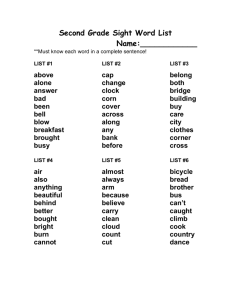Time
advertisement
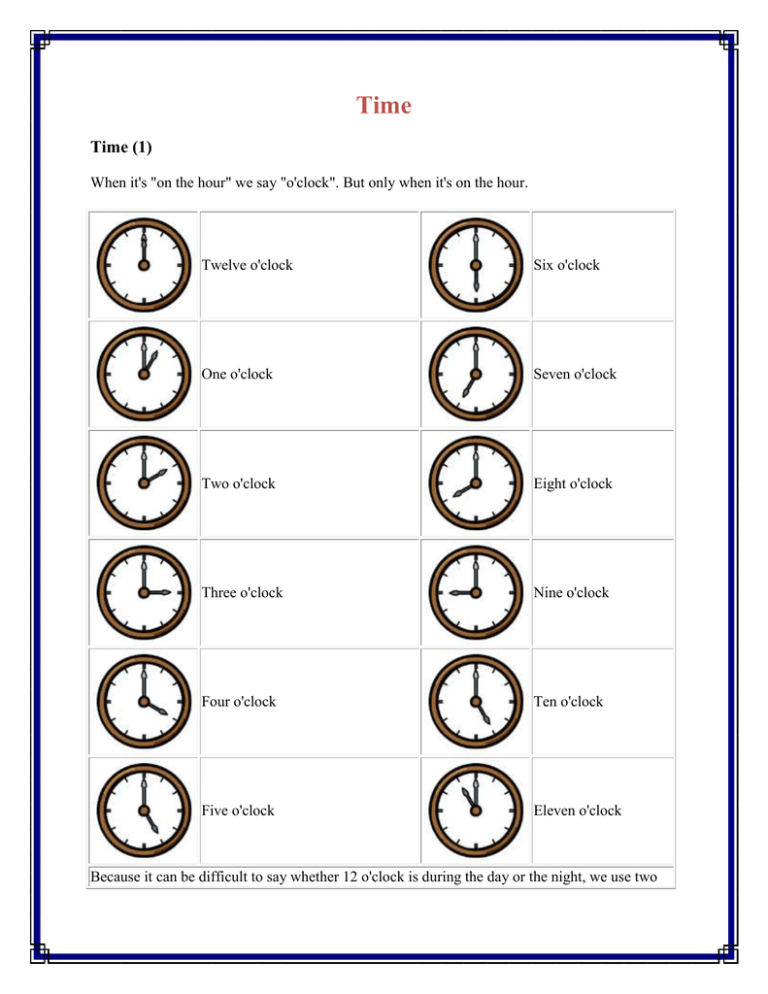
Time Time (1) When it's "on the hour" we say "o'clock". But only when it's on the hour. Twelve o'clock Six o'clock One o'clock Seven o'clock Two o'clock Eight o'clock Three o'clock Nine o'clock Four o'clock Ten o'clock Five o'clock Eleven o'clock Because it can be difficult to say whether 12 o'clock is during the day or the night, we use two special terms. 00:00 and 24:00 = Twelve midnight (or midnight) 12:00 = Twelve noon (or noon) Time (2) In five minute increments, when it's past the hour (up to 30 minutes past) we say "past". When it's before the hour (after 30 minutes past) we say "to". There are 60 minutes in an hour. 30 minutes is half an hour, we say "half past" or "thirty". 15 minutes is quarter of an hour, we say "quarter past" or "fifteen" or "quarter to" or "forty-five". Twelve fifteen Twelve o'clock or Quarter past twelve Twelve thirty Twelve forty-five or or Half past twelve Quarter to one We never say "half to". At other "odd" times, when we want to be accurate, we add the word "minute(s)":- It's twenty-eight minutes to twelve. It's one minute past three. If you want to avoid trying to remember when to use "minutes" and when not to just say "nearly" or "just turned". It's just turned half past eleven. It's nearly three o'clock. Prepositions used with time At a point in time "When shall we meet? In a length of time "It's 12.45, "Let's meet when will you at 12.30." be ready? "I'll see you in an hour, at about 1.45." Naturally speaking Digital clocks often show the time this way using the 24-hour-clock, only the police and the military actually speak using the 24 hour clock:- If it's before noon we tend to say "in the morning". If it's after noon we say "in the afternoon". 07:00 14:00 It's seven o'clock in the morning It's two o'clock in the afternoon If it's late we say "at night". 22:00 It's ten o'clock at night 15 minutes past the hour is quarter past: 07:15 14:15 It's quarter past seven in the morning It's quarter past two in the afternoon 22:15 It's quarter past ten at night 30 minutes past the hour is half past: 07:30 14:30 It's half past seven in the morning It's half past two in the afternoon 22:30 It's half past ten at night 45 minutes past the hour is quarter to: 07:45 14:45 It's quarter to eight in the morning It's quarter to three in the afternoon 22:45 It's quarter to eleven at night How to ask the time in English. o Excuse me. What time is it, please? It's exactly eight o'clock. It's eight. or o o Excuse me. Do you have the time, please? It's half past twelve. It's twelve thirty. It's about half past eleven. It's around eleven thirty. or Excuse me. Could you tell me the time, please? or Work time There are some common words and phrases that we use to describe the hours we work. At work in the UK we talk about starting time and leaving time. 9-to-5 is a phrase used to describe a conventional and possibly tedious job. Negatively used, it connotes a tedious or unremarkable occupation, the idea being that, because the job is so boring, the workplace shuts down outside of required hours. The phrase also indicates that a person is an employee, usually in a large company, rather than self-employed. More neutrally, it connotes a job with stable hours and low career risk, but still a position of subordinate employment. Overtime is the time we work in addition to what is normal. Overtime is either paid, or unpaid. Full time (full-time) is the term we use to describe the whole of someone's available working time, typically 40 hours in a week, but the European Union's working time directive imposes a 48 hour maximum working week that applies to every member state except here in the United Kingdom (which has an opt-out meaning that UK-based employees may work longer than 48 hours if they wish, but they cannot be forced to do so). Part time (part-time) is the term we use to describe employment with fewer hours per week than a full-time job. Time off is the term we use to describe time for rest or recreation away from one's usual work or studies. Time in lieu refers to taking time off instead of, or in addition to, receiving pay for overtime worked or working on public or bank holidays. Writing the time morning 00:01 11:59 a.m. - stands for Ante Meridiem (the time between midnight and noon) 00:01 hrs 12:00 noon or midday 12:00 p.m. - stands for Post Meridian (after noon) 12:01 24:00 hrs afternoon 12:01 18:00 evening 18:01 22:00 night 22:01 24:00 midnight 24:00 / 00:00 There are 24 hours in a day, but only the military, police and computer programmers use the 24hour clock. When writing or speaking generally we tend to use the 12-hour clock. The 24 hours of the day are divided into two periods called a.m. (Latin "ante meridiem" | English: "before mid day") and p.m. (Latin "post meridiem" | English: "after mid day"). The way people write the time varies. I prefer a.m. and p.m. Choose from the following styles or use what your English teacher tells you to and stick to it:a.m. p.m. am pm AM PM A.M. P.M. Some people (myself included) use a dot as the separator: 2.30 pm. Some people use a colon as the separator: 2:30 pm. The colon is usually used with the 24-hour clock: 14:30. When you are writing the time decide whether to write it using numerals or words, and stick to that.
